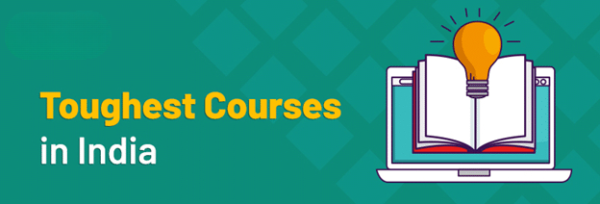In the landscape of higher education in India, some courses stand out not only for their popularity but for their demanding nature, which tests students’ intellect, perseverance, and dedication. The toughest courses in India push students to their limits, whether through mastering complex theories, tackling competitive exams, or enduring lengthy study periods. These courses require a unique blend of academic prowess and personal commitment, often determining future career success in highly specialized fields.
Understanding the Toughest Courses in India
Defining what constitutes the toughest courses in India is challenging. It involves more than just a rigorous curriculum; it also includes intense entrance competition, the depth of understanding required, and the demands of the job market upon completion. Technical courses often top the list due to their practical applications and the ever-evolving nature of their content. Additionally, personal interest and dedication play crucial roles; what might be challenging for one student could be invigorating for another.
This article explores the top 10 toughest courses in India for 2024, delving into what makes each of them a formidable choice for students.
Top 10 Toughest Courses in India

1. Medicine
Course Overview: MBBS (Bachelor of Medicine and Bachelor of Surgery)
Duration: 5.5 years
Medicine consistently ranks among the toughest courses in India. To become a medical professional, students must first clear the NEET (National Eligibility cum Entrance Test), a highly competitive exam with an extensive syllabus covering subjects such as biology, physics, and chemistry. Once admitted, the training involves rigorous theoretical education and extensive practical experience in clinical settings. Specialization further extends the duration and demands of the course, underscoring the pressures in this field.
2. Chartered Accountancy (CA)
Course Overview: CA Foundation, CA Intermediate, CA Final
Duration: 3-4 years
Becoming a Chartered Accountant (CA) in India involves passing three extremely challenging exams over several years. The curriculum covers complex financial concepts, including accounting principles, taxation, auditing, and business law. The CA process is not only costly but also time-consuming, with a low pass rate reflecting the high standards expected in the financial sector.
3. Engineering
Course Overview: Bachelor of Technology (B.Tech)
Duration: 4 years
Engineering programs in India, particularly those offered by prestigious institutions like the IITs (Indian Institutes of Technology), are renowned for their demanding nature. The entrance exams, JEE Main and JEE Advanced, are among the toughest in the country. The curriculum includes in-depth studies in subjects ranging from mathematics and physics to specialized engineering disciplines such as computer science and mechanical engineering. Practical projects and internships further add to the workload, preparing students for real-world challenges.
4. MBA (Master of Business Administration)
Course Overview: MBA
Duration: 2 years
An MBA from a top-tier institution opens doors to lucrative management careers but demands significant dedication. The program covers various areas such as finance, marketing, operations, and human resources, requiring students to analyze complex business scenarios and make strategic decisions. The admission process is highly competitive, with entrance exams like CAT (Common Admission Test) and GMAT (Graduate Management Admission Test) assessing analytical, quantitative, and general knowledge skills.
5. Architecture
Course Overview: Bachelor of Architecture (B.Arch)
Duration: 5 years
Architecture combines artistic creativity with technical precision, making it a challenging field of study. The curriculum covers design theories, building construction techniques, sustainable development, and urban planning. Entrance exams like the National Aptitude Test in Architecture (NATA) test candidates on spatial awareness, aesthetic sensitivity, and critical thinking. Studio-based learning is crucial for developing practical design solutions.
6. Law
Course Overview: Bachelor of Legislative Law (LLB)
Duration: 3 years (after graduation)
Legal education requires quick thinking, analytical reasoning, and a deep understanding of legal frameworks. Students study a wide range of subjects, including constitutional law, criminal law, and international law, with a strong emphasis on case studies and legal precedents. Entrance exams for law schools often test candidates on reasoning, language, and legal aptitude, reflecting the competitive nature and high standards of legal education.
7. Civil Services
Course Overview: UPSC Civil Services Examination
Duration: Variable (based on clearing all three stages)
The UPSC Civil Services Examination is one of the most challenging courses in India, selecting candidates for prestigious positions such as IAS (Indian Administrative Service), IPS (Indian Police Service), and IFS (Indian Foreign Service). The exam consists of preliminary, mains, and interview stages, covering a broad range of subjects from current affairs to history and governance. The vast syllabus and low selection rate highlight the exam’s demanding nature.
8. Pharmacy
Course Overview: Bachelor of Pharmacy (B.Pharm)
Duration: 4 years
Pharmacy education in India combines scientific knowledge with practical application in drug development and healthcare. The curriculum includes pharmaceutical organic and inorganic chemistry, as well as practical training in pharmacies and healthcare institutions. Students must have a strong grasp of chemistry, Ayurveda, and pharmacognosy, preparing them for careers in research, clinical practice, and pharmaceutical sales.
9. aster of Philosophy (M.Phil)
Course Overview: M.Phil
Duration: 2 years
The M.Phil program focuses on research and critical analysis in specific academic fields, preparing students for doctoral studies. Candidates engage in independent research, prepare a thesis, and defend it before a panel. Admission often requires passing examinations like GATE (Graduate Aptitude Test in Engineering) or university-specific entrance tests, reflecting the academic and research demands of the program.
10. Psychology
Course Overview: Bachelor of Arts (BA) or Bachelor of Science (BSc) in Psychology
Duration: 3 years
Psychology involves studying human behavior, cognition, and emotions, requiring students to understand diverse psychological theories and research methods. The curriculum includes clinical psychology, social psychology, and neuropsychology, demanding empathy, ethical awareness, and analytical skills. Practical training through internships and research projects complements theoretical learning, preparing students for careers in counseling, research, or clinical practice.
Conclusion
Choosing one of the toughest courses in India is more than just an academic challenge; it involves aligning personal interests with career aspirations. Each of these top 10 toughest courses demands dedication, perseverance, and a passion for learning, equipping graduates for successful careers in their respective fields. Whether it is the rigorous training in medicine or the complex financial principles in chartered accountancy, these courses prepare students for rewarding and impactful professional lives.


